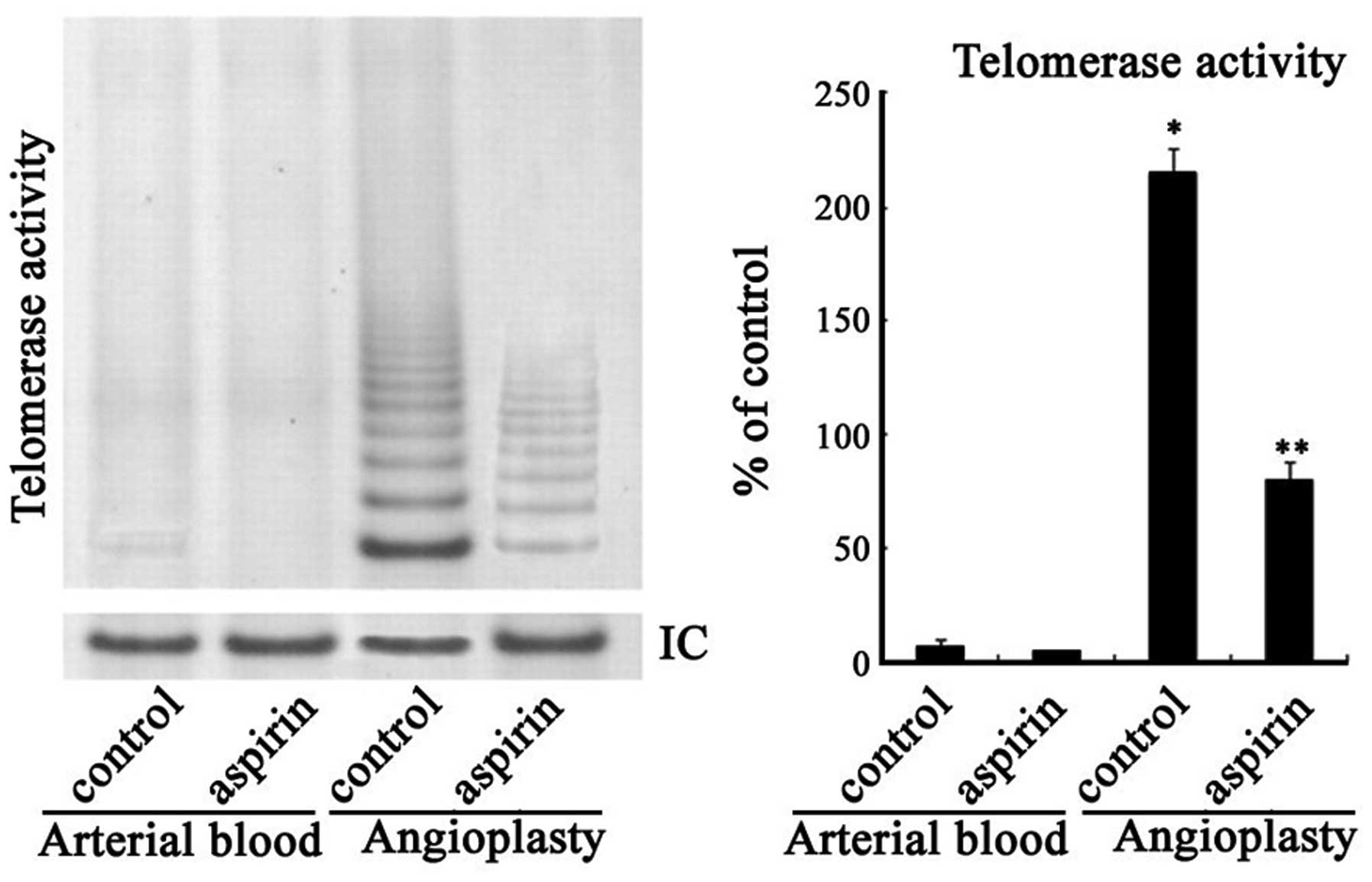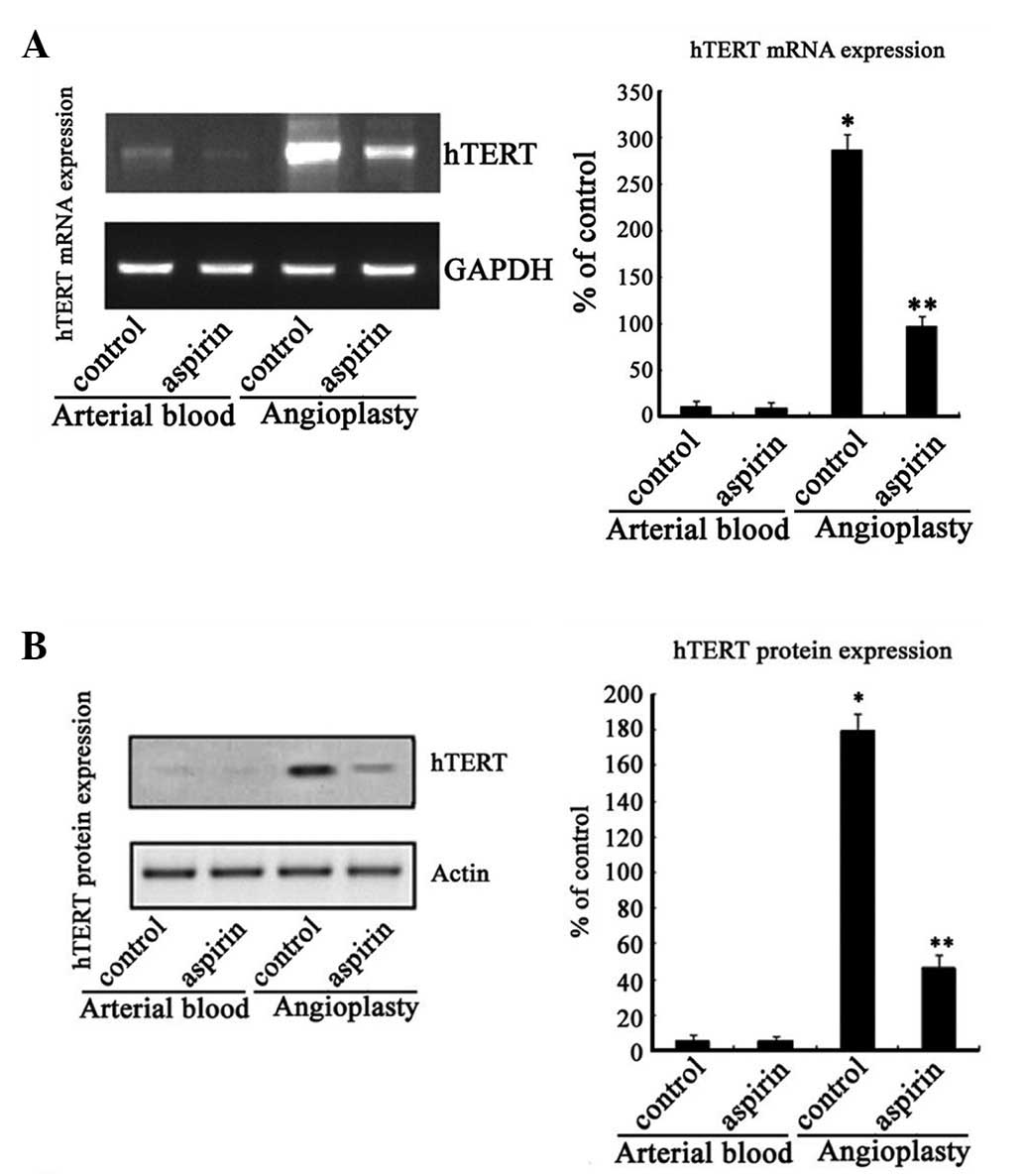|
1.
|
Samani NJ and van der Harst P: Biological
ageing and cardiovascular disease. Heart. 94:537–539. 2008.
View Article : Google Scholar : PubMed/NCBI
|
|
2.
|
Greider CW: Telomerase activity, cell
proliferation, and cancer. Proc Natl Acad Sci USA. 95:90–92. 1998.
View Article : Google Scholar : PubMed/NCBI
|
|
3.
|
Le S, Sternglanz R and Greider CW:
Identification of two RNA-binding proteins associated with human
telomerase RNA. Mol Biol Cell. 11:999–1010. 2000. View Article : Google Scholar : PubMed/NCBI
|
|
4.
|
Bailey SM and Murnane JP: Telomeres,
chromosome instability and cancer. Nucleic Acids Res. 34:2408–2417.
2006. View Article : Google Scholar : PubMed/NCBI
|
|
5.
|
Harley CB and Villeponteau B: Telomeres
and telomerase in aging and cancer. Curr Opin Genet Dev. 5:249–255.
1995. View Article : Google Scholar : PubMed/NCBI
|
|
6.
|
Shay JW and Wright WE: Hayflick, his
limit, and cellular ageing. Nat Rev Mol Cell Biol. 1:72–76. 2000.
View Article : Google Scholar : PubMed/NCBI
|
|
7.
|
Holt SE, Glinsky VV, Ivanova AB and
Glinsky GV: Resistance to apoptosis in human cells conferred by
telomerase function and telomere stability. Mol Carcinog.
25:241–248. 1999. View Article : Google Scholar : PubMed/NCBI
|
|
8.
|
Yang J, Chang E, Cherry AM, et al: Human
endothelial cell life extension by telomerase expression. J Biol
Chem. 274:26141–26148. 1999. View Article : Google Scholar : PubMed/NCBI
|
|
9.
|
Weinmann P, Gaehtgens P and Walzog B:
Bcl-Xl- and Bax-alpha-mediated regulation of apoptosis of human
neutrophils via caspase-3. Blood. 93:3106–3115. 1999.PubMed/NCBI
|
|
10.
|
Sung YH, Choi YS, Cheong C and Lee HW: The
pleiotropy of telomerase against cell death. Mol Cells. 19:303–309.
2005.PubMed/NCBI
|
|
11.
|
Naruko T, Ueda M, Haze K, et al:
Neutrophil infiltration of culprit lesions in acute coronary
syndromes. Circulation. 106:2894–2900. 2002. View Article : Google Scholar : PubMed/NCBI
|
|
12.
|
Husain S, Andrews NP, Mulcahy D, Panza JA
and Quyyumi AA: Aspirin improves endothelial dysfunction in
atherosclerosis. Circulation. 97:716–720. 1998. View Article : Google Scholar : PubMed/NCBI
|
|
13.
|
Cyrus T, Yao Y, Tung LX and Praticò D:
Stabilization of advanced atherosclerosis in low-density
lipoprotein receptor-deficient mice by aspirin. Atherosclerosis.
184:8–14. 2006. View Article : Google Scholar : PubMed/NCBI
|
|
14.
|
Biasucci LM, Liuzzo G, Grillo RL, et al:
Elevated levels of C-reactive protein at discharge in patients with
unstable angina predict recurrent instability. Circulation.
99:855–860. 1999. View Article : Google Scholar : PubMed/NCBI
|
|
15.
|
Narducci ML, Grasselli A, Biasucci LM, et
al: High telomerase activity in neutrophils from unstable coronary
plaques. J Am Coll Cardiol. 50:2369–2374. 2007. View Article : Google Scholar : PubMed/NCBI
|
|
16.
|
He H, Xia HH, Wang JD, et al: Inhibition
of human telomerase reverse transcriptase by nonsteroidal
antiinflammatory drugs in colon carcinoma. Cancer. 106:1243–1249.
2006. View Article : Google Scholar : PubMed/NCBI
|
|
17.
|
Poch E, Carbonell P, Franco S, Díez-Juan
A, Blasco MA and Andrés V: Short telomeres protect from
diet-induced atherosclerosis in apolipoprotein E-null mice. FASEB
J. 18:418–420. 2004.PubMed/NCBI
|
|
18.
|
Brouilette SW, Moore JS, McMahon AD, et
al: Telomere length, risk of coronary heart disease, and statin
treatment in the West of Scotland Primary Prevention Study: a
nested case-control study. Lancet. 369:107–114. 2007. View Article : Google Scholar : PubMed/NCBI
|
|
19.
|
Gizard F, Heywood EB, Findeisen HM, et al:
Telomerase activation in atherosclerosis and induction of
telomerase reverse transcriptase expression by inflammatory stimuli
in macrophages. Arterioscler Thromb Vasc Biol. 31:245–252. 2011.
View Article : Google Scholar : PubMed/NCBI
|
|
20.
|
Ducrest AL, Szutorisz H, Lingner J and
Nabholz M: Regulation of the human telomerase reverse transcriptase
gene. Oncogene. 21:541–552. 2002. View Article : Google Scholar : PubMed/NCBI
|
|
21.
|
Hiyama K, Hirai Y, Kyoizumi S, et al:
Activation of telomerase in human lymphocytes and hematopoietic
progenitor cells. J Immunol. 155:3711–3715. 1995.PubMed/NCBI
|
|
22.
|
Robertson JD, Gale RE, Wynn RF, Dougal M,
Linch DC, Testa NG and Chopra R: Dynamics of telomere shortening in
neutrophils and T lymphocytes during ageing and the relationship to
skewed X chromosome inactivation patterns. Br J Haematol.
109:272–279. 2000. View Article : Google Scholar : PubMed/NCBI
|
|
23.
|
Norrback KF, Enblad G, Erlanson M,
Sundström C and Roos G: Telomerase activity in Hodgkin's disease.
Blood. 92:566–573. 1998.
|
|
24.
|
Kim NW, Piatyszek MA, Prowse KR, et al:
Specific association of human telomerase activity with immortal
cells and cancer. Science. 266:2011–2015. 1994. View Article : Google Scholar : PubMed/NCBI
|
|
25.
|
Wong JM and Collins K: Telomere
maintenance and disease. Lancet. 362:983–988. 2003. View Article : Google Scholar : PubMed/NCBI
|
|
26.
|
Bodnar AG, Oulette M, Frolkis M, et al:
Extension of life-span by introduction of telomerase into normal
human cells. Science. 279:349–352. 1998. View Article : Google Scholar : PubMed/NCBI
|
|
27.
|
Satyanarayana A, Manns MP and Rudolph KL:
Telomeres, telomerase and cancer: an endless search to target the
ends. Cell Cycle. 3:1138–1150. 2004. View Article : Google Scholar : PubMed/NCBI
|
|
28.
|
Zimmerman S and Martens UM: Telomeres and
telomerase as targets for cancer therapy. Cell Mol Life Sci.
64:906–921. 2007. View Article : Google Scholar : PubMed/NCBI
|
|
29.
|
Kang SS, Kwon T, Kwon DY and Do SI: Akt
protein kinase enhances human telomerase activity through
phosphorylation of telomerase reverse transcriptase subunit. J Biol
Chem. 274:13085–13090. 1999. View Article : Google Scholar
|
|
30.
|
Li H, Zhao L, Yang Z, Funder JW and Liu
JP: Telomerase is controlled by protein kinase Cα in human breast
cancer cells. J Biol Chem. 273:33436–33442. 1998.PubMed/NCBI
|
















